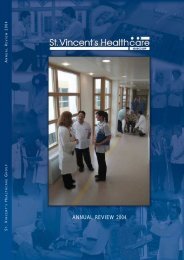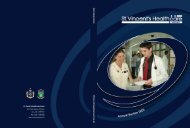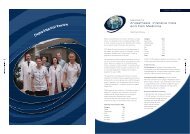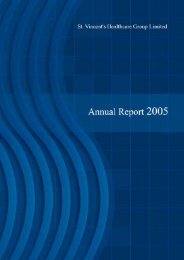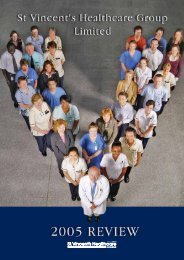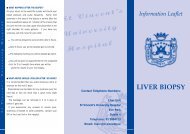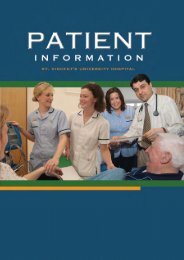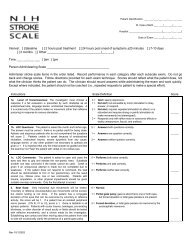ANNUAL REVIEW master Final3a - St Vincent's University Hospital
ANNUAL REVIEW master Final3a - St Vincent's University Hospital
ANNUAL REVIEW master Final3a - St Vincent's University Hospital
Create successful ePaper yourself
Turn your PDF publications into a flip-book with our unique Google optimized e-Paper software.
<strong>St</strong>. Vincent’s Healthcare Group Limited - Annual Review 2007<br />
Education & Research<br />
E. Ryan, J. Hegarty, C. O’Farrelly. GMCSF may modulate the response to IFN-alpha in Chronic Hepatitis C<br />
Virus (HCV) infection. Keystone Viral Immunity Conference Jan 20-25 2008 – Colorado.<br />
M. O’ Brien, M. Exley, D. O’ Donoghue, J. E. Hegarty, C. O’ Farrelly. Alternative splicing of CD1d in colorectal<br />
cancer: implications for tumour surveillance. Irish Society of Gastroenterology Nov 29, 30 2007 – Clontarf<br />
Castle, Dublin<br />
K.S. Nanda, E. J. Ryan, L. Gallagher, M. Mc Kenna, B. Murray, C. O’ Farrelly, & J. Hegarty. Does chronic<br />
Hepatitis C Virus (HCV) infection contribute to bone disease by disrupting the OPG/RANKL/TRAIL<br />
pathway? Irish Society of Gastroenterology April 19-20 2007 – Killarney, Kerry<br />
Endocrinology & Diabetes Mellitus<br />
Consultants: Professor T.J. McKenna, Dr Malachi McKenna,<br />
Dr Donal O’Shea,<br />
Dr Ronan Canavan<br />
Lecturers: Department of Medicine, U.C.D.: Dr Gianluca Tamagno Dr Deirdre Blake.<br />
Specialist Registrars: Dr Eoin Noctor, Dr Conall Dennedy<br />
Registrars: Dr Tomás Ahern, Dr G Goawetse<br />
Research Registrar: Dr Jean O’Connell, Dr Mohammed Bashir,<br />
Dr Tom Cawood<br />
Endocrine Laboratory, Principal Biochemist: Dr. Tom Smith<br />
Research-Graduate <strong>St</strong>udents:<br />
Lucille Kavanagh<br />
Research Projects<br />
Macroprolactin (Lucille Kavanagh, Prof TJ McKenna and Dr Tom Smith)<br />
Lucille Kavanagh is supported by a grant from the Health Research Board to support her elucidation of the<br />
nature of macroprolactin. Prolactin is a hormone which comes from the pituitary gland. High levels of<br />
prolactin is the underlying cause in approximately 25% of patients who present with failure of ovulation. This<br />
affects approximately 1-2% of all women. Our studies have highlighted the fact that the laboratory finding<br />
of approximately 10-20% of measurements indicating high levels or prolactin may be misleading. This is due<br />
to the presence of macroprolactin. Macroprolactin is a form of prolactin which, although measured in the<br />
assays, is not active in patients. This department has previously published extensively on laboratory<br />
techniques which may eliminate macroprolactin and also on the clinical consequences of failure to undertake<br />
routine screening for macroprolactin. While routine screening is generally undertaken in Ireland as a<br />
consequence of this laboratory’s research and in 80% of laboratories in the United Kingdom and to a lesser<br />
extent in Europe, screening is the exception rather than the rule in the United <strong>St</strong>ates. Further publications<br />
from this laboratory in the leading American laboratory and clinical journals is attempting to address this<br />
situation. The renowned Mayo Clinic laboratories have recently announced the provision of a service which<br />
screens for macroprolactin. In launching the service, the Mayo Laboratories Communique cited six scientific<br />
articles, four of which were from this department.<br />
Return to Contents<br />
38




